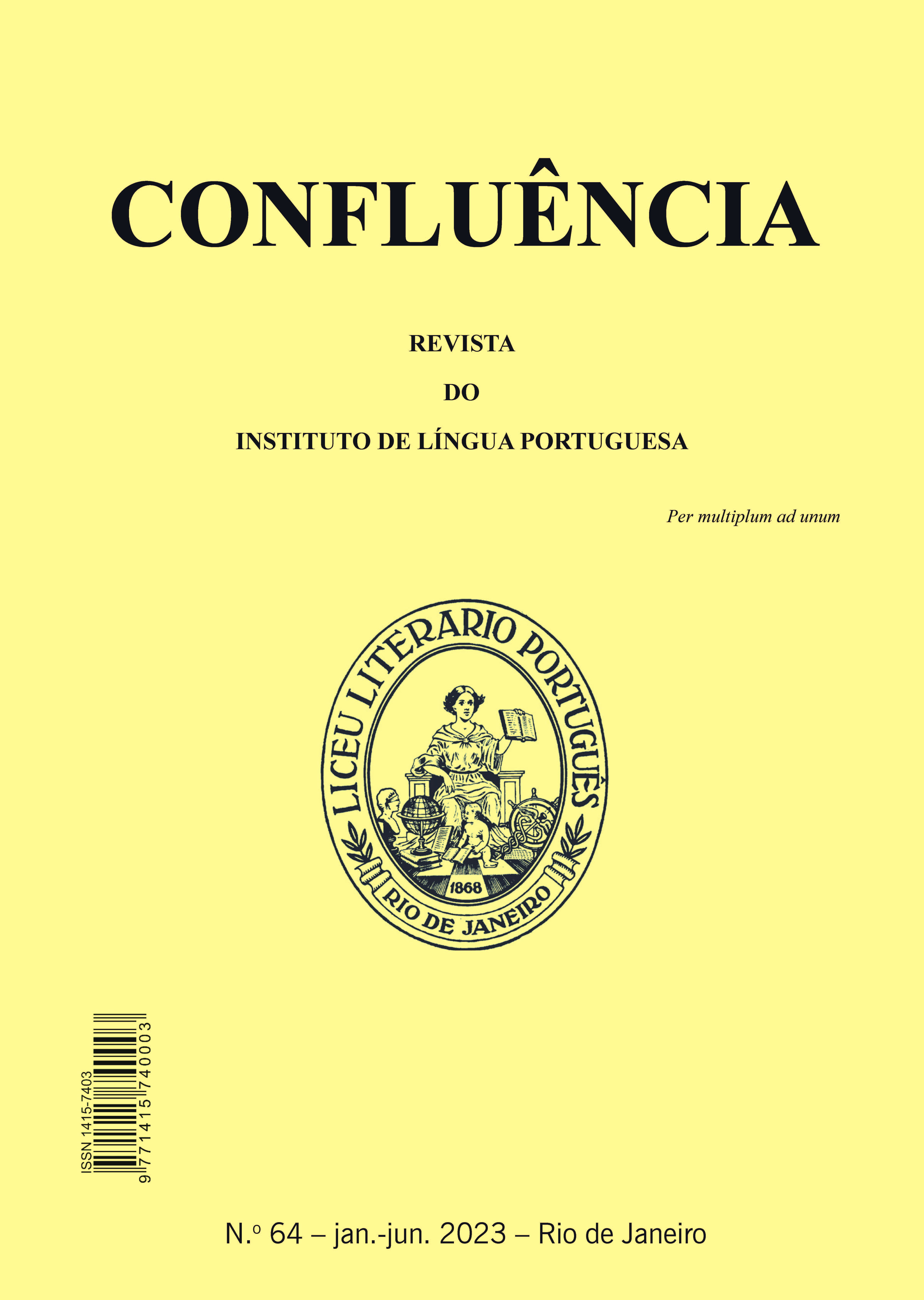“Se Fosse Fácil, Todo Mundo Fazia”: problemas de descrição e ensino no emprego de modos e tempos verbais
DOI:
https://doi.org/10.18364/rc.2023n64.1313Palavras-chave:
Modos e tempos verbais, descrição, ensino, proposta didáticaResumo
Tradicionalmente, referenciais teóricos como a Nomenclatura Gramatical Brasileira (NGB), gramáticas e/ou livros didáticos figuram como materiais de autoridade em relação à descrição e ao ensino de língua portuguesa. Tidos como objetos de verdades linguísticas, as obras são de amplo uso em todos os segmentos didáticos. Em relação à descrição dos modos e tempos verbais, apesar de algumas poucas exceções – como em Bechara (2009) –, apresentam-se a alunos e professores explicações que tendem à unanimidade, com pouco espaço – ou nenhum, no caso da NGB – para questionamentos e críticas. Nesse contexto, expressões de uso popular como “se fosse fácil, todo mundo fazia” emergem como construções que colocam o professor e o ensino em situações problemáticas. Nosso texto tem por objetivo apresentar um breve panorama da descrição dos modos e tempos verbais, mostrando como suas imprecisões têm efeito imediato no ensino da língua portuguesa. Ao fim, propusemos alguns possíveis caminhos didáticos que o professor pode trilhar nesses casos.
Downloads
Referências
ANTUNES, Irandé. Gramática contextualizada – limpando “o pó das ideias simples”. São Paulo: Parábola, 2014.
ANTUNES, Irandé. Análise de textos: fundamentos e práticas. São Paulo: Párabola, 2010.
ANTUNES, Irandé. Aula de português: encontro & interação. São Paulo: Parábola, 2003.
AZEREDO, José Carlos Santos de. Gramática Houaiss da Língua Portuguesa. 4. ed. São Paulo: Publifolha, 2018.
BECHARA, Evanildo. Moderna gramática portuguesa. Rio de Janeiro: Nova Fronteira, 2009.
BRASIL, Ministério da Educação. Nomenclatura Gramatical Brasileira. Rio de Janeiro: CADES, 2008.
CAMARA, T. M. N. L. ; FELIPE, MÁRCIA DA GAMA SILVA ; EVARISTO, Jefferson. Ensinar língua portuguesa: uma discussão sempre ultrapassada e sempre nova. In: Descrição, Contato e Ensino de Língua Portuguesa. 1ed. Rio de Janeiro: Programa de Pós-graduação em Letras - UERJ, 2022.
CAMARGO, Thaís N. de. Língua padrão e cidadania. In: HENRIQUES, Claudio C.; SIMÕES, Darcilia M. P. Língua e Cidadania: novas perspectivas para o ensino. Rio de Janeiro: Editora Europa, 2004.
CEREJA, William Roberto. Português contemporâneo: diálogo, reflexão e uso – volume 2. São Paulo: Saraiva, 2016.
CINTRA, Monique Carbone. Considerações sobre o emprego do futuro do subjuntivo na produção escrita de aprendizes italianos de PLE. 31/05/2016 168f. Mestrado em Linguística e Língua Portuguesa. Universidade Estadual paulista, Araraquara.
CUNHA, Celso; CINTRA, Lindley. Nova gramática do português contemporâneo. 4. ed. revista e ampliada. Rio de Janeiro: Lexikon, 2017.
EVARISTO, Jefferson. Língua Portuguesa, Educação e Cidadania: Proclamação da Interdependência. HUMANIDADES & INOVAÇÃO, v. 5, p. 120-130, 2018.
EVARISTO, Jefferson; COELHO, Fábio A. C. ; SCHLEE, Magda Bahia . Formação de professores: da teoria à prática, o “início” e a “continuação”. In: Jefferson Evaristo do Nascimento Silva; Fábio André Cardoso Coelho, Magda Bahia Schlee. (Org.). Formação de professores: da teoria à prática, o “início” e a “continuação”. 1ed.Rio de Janeiro: Dialogarts, 2018.
FUZA, Angela F; et al. Concepções de linguagem e o ensino da leitura em língua materna. Linguagem & Ensino, Pelotas, v.14, n.2, p. 479-501, jul./dez, 2011.
GIOMI, Riccardo. Para uma caracterização semântica do futuro sintético romântico: descrição e análise dos valores do futuro do indicativo em português e em italiano. 2010 232f. Mestrado em Linguística. Universidade de Lisboa, Lisboa.
HAWAD, Helena Feres. Ensinando gramática para o uso da língua materna. Matraga, Rio de Janeiro, v.19 n.30, jan./jun, 2012.
HENRIQUES, Claudio Cezar. Nomenclatura Gramatical Brasileira: 50 anos depois. São Paulo: Parábola, 2009.
LIMA, Carlos Henrique da Rocha. Gramática normativa da língua portuguesa. Rio de Janeiro: José Olympio, 2003.
SILVA-ALVES, Jefferson Evaristo do Nascimento; COELHO, Fábio A. C. . Sobre a arte de ensinar - o Eu, o aluno e o professor. In: Ensino de Língua Portuguesa: Fundamentos e Aplicações. 1ed.Rio de Janeiro: Editora Telha, 2020.
SILVA-ALVES, Jefferson Evaristo do Nascimento; FELIPE, Márcia Da Gama Silva; CAMARA, T. M. N. L.; MONTEIRO, Luiz A. C. (Orgs.). Evanildo Bechara e os bastidores da NGB. Rio de Janeiro: Dialogarts, 2020.
SILVA-ALVES, Jefferson Evaristo do Nascimento; FELIPE, Márcia Da Gama Silva; MONTEIRO, Luiz A. C. ; RETONDAR, Heloana C. ; SANTOS, Marizeth F. dos. Um passeio pela tradição linguística na primeira pessoa do plural. In: Evanildo Bechara e os bastidores da NGB. Rio de Janeiro: Dialogarts, 2020.
SILVA-ALVES, Jefferson Evaristo do Nascimento; FELIPE, Márcia Da Gama Silva; MONTEIRO, Luiz A. C.; RETONDAR, Heloana C.; SANTOS, Marizeth F. dos. Análise de matérias jornalísticas sobre a NGB. In: Evanildo Bechara e os bastidores da NGB. Rio de Janeiro: Dialogarts, 2020.
TERRA, Ernani. Gramática, literatura & redação para o ensino médio. São Paulo: Scipione, 1997.
Downloads
Publicado
Edição
Seção
Licença
Copyright (c) 2022 Jefferson Evaristo

Este trabalho está licenciado sob uma licença Creative Commons Attribution-NonCommercial 4.0 International License.
Autores que publicam nesta revista concordam com os seguintes termos: a.Autores mantêm os direitos autorais e concedem à revista o direito de primeira publicação, com o trabalho simultaneamente licenciado sob a Licença Creative Commons Attribution que permite o compartilhamento do trabalho com reconhecimento da autoria e publicação inicial nesta revista. b.Autores têm autorização para assumir contratos adicionais separadamente, para distribuição não-exclusiva da versão do trabalho publicada nesta revista (ex.: publicar em repositório institucional ou como capítulo de livro), com reconhecimento de autoria e publicação inicial nesta revista. c.Autores têm permissão e são estimulados a publicar e distribuir seu trabalho online (ex.: em repositórios institucionais ou na sua página pessoal) a qualquer ponto antes ou durante o processo editorial, já que isso pode gerar alterações produtivas, bem como aumentar o impacto e a citação do trabalho publicado









